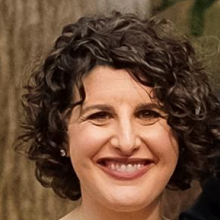2023 SRCD State Policy Fellow Spotlight: Lara Markovitz, Ph.D.
Lara Markovitz a SRCD State Policy Post-Doctoral Fellow in the Office of Child Support (OCS) in the Michigan Department of Health and Human Services (MDHHS).
In a few sentences, what is your role at the agency you work for?
I am a first-year fellow at the Michigan Department of Health and Human Services in the Office of Child Support, Program Development Division, where I help to analyze the implications of child support policies on family wellbeing and economic security. Specifically, my work focuses on addressing systemic inequities that increase financial and emotional strain among parents and families.
What has been the most memorable project you have completed during your time at the agency?
Currently, I am involved in several initiatives seeking to increase community involvement in policy decision making and access to resources and information about child support. I have contributed to the application and onboarding process of new Community Advisory Council members and helped plan for the implementation of the equity impact assessment. The equity impact assessment is a tool to guide policy makers as they evaluate the potential impact of policies on the diverse communities served by the child support program. I have also had the opportunity to help write grant proposals to support related initiatives.
What words of wisdom might you pass on to someone who is interested in SRCD’s fellowship program?
This fellowship is an opportunity to explore areas that you may know little about or is not related to your research. I would recommend being open to opportunities to work on projects in these areas. For example, one of the most interesting projects I have worked on as a fellow is one that I initially volunteered to help with as a minute taker. I have become deeply involved with this project and have had the opportunity to gather community resources, develop journey maps, and engage in interesting and complex policy discussions about this topic with members from across different agencies.
What piqued your interest in working in policy?
As a bilingual social worker and case manager in New York City, I was struck by how dramatically changes in policy could hinder or promote child and family wellbeing by restricting or facilitating access to housing, healthcare, and other critical resources. I observed unintended consequences of these policy changes and became interested in the implementation process, and how “street level bureaucrats” contributed to gaps between policy goals and outcomes. As a doctoral student, I sought additional policy coursework and mentoring from a policy professor whose support was instrumental in preparing me to explore these questions as a fellow.
What has been your favorite aspect of SRCD’s fellowship? Please explain why.
This fellowship has given me the opportunity to bridge my experiences as a practitioner and interest in policy with the support of dedicated, knowledgeable, wise, and supportive mentors from state government, academia, and SRCD.
Where are you from?
My hometown is Ann Arbor, Michigan. After living in other cities for many years, I moved back to Ann Arbor to be closer to family.
